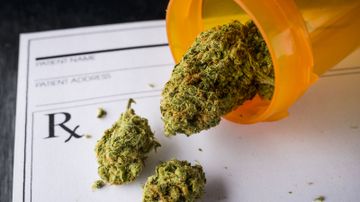Researchers at the University of New Mexico (UNM) and California State Polytechnic University (CalPoly) address a major gap in the scientific literature, finding that medical Cannabis may not only treat such health conditions as chronic pain and epilepsy, but may also be effective at alleviating other commonly experienced hindrances to well-being such as insomnia.
In particular, the authors, Assistant Professor Jacqueline Doremus (CalPoly, Economics), Assistant Professor Sarah Stith (UNM, Economics) and Associate Professor Jacob Vigil (UNM, Psychology) find that access to recreational Cannabis decreases demand for over-the-counter, or OTC, sleep aids, including diphenhydramine (Benadryl) and doxylamine (Unisom).
The recent study, titled "Using Recreational Cannabis to Treat Insomnia: Evidence from Over-The-Counter Sleep Aid Sales in Colorado" and published in the journal Complementary Therapies in Medicine, uses Universal Product Code (UPC) level retail scanner data from Colorado retailers and finds that the market share of OTC sleep aids decreases when recreational Cannabis becomes available via dispensaries nearby. The authors further find that these effects are driven by more dangerous classes of OTC sleep aids, including diphenhydramine and doxylamine, which can be contraindicated for older populations.
The findings are based on the largest repository of UPC-level scanner data in the country, the Nielsen data set, collected by the Nielsen Company and available through the Kilts Center for Marketing at the Chicago Booth School of Business. The authors used these data to create market shares for OTC sleep aids to measure how the store-level OTC sleep aid market shares changed when a recreational cannabis dispensary entered in the same county in which the store operates. The authors found that previously increasing market shares reversed course and declined with the availability of recreational cannabis. As more dispensaries entered a store's county, the effect became even stronger.
The study aimed to address the practical question of whether the therapeutic benefits of cannabis extend beyond those covered by state medical programs; conditions which typically can only be treated using recreational cannabis. Due to the Schedule 1 status of cannabis and its inherent lack of product standardization, it would be difficult to design randomized controlled trials to address this important research question.
The authors instead used observational data and econometric/statistical techniques designed to establish causality using observational data and tested whether, even absent medical guidance, individuals were changing their use of OTC sleep aids.
Corresponding author Sarah Stith offers the following explanation for the results, "We see OTC sleep aid purchases declining, which could come from individuals directly using cannabis to treat their sleep disorders or because cannabis affects underlying conditions and behaviors that affect sleep, e.g., anxiety. Our prior research supports the existence of both mechanisms."
Cannabis is rapidly gaining popularity and has been shown to be a promising substitute for prescription opioids and other classes of medications, which often carry undesirable side effects, dangerous drug interactions, and risk of death. Provider-driven medication using cannabis lags self-medication in part due to the lack of research on the topic.
"Economics uniquely offers tools for dealing with the historical hurdles faced by cannabis researchers, who typically focus on difficult-to-conduct randomized control trials or simple surveys," Doremus explained. "Large observational data sets and "natural" or quasi-experimental research designs allow us to gain insight into the effects of cannabis, an area in which traditional approaches to medical research have failed to create the information required for individuals to make informed decisions regarding their use of cannabis."
This study uses a quasi-experimental research design and observational data to show that cannabis is preferred by a statistically significant subsample of the population to conventional OTC sleep aids and/or is affecting overall population health in such a way that many individuals no longer need OTC sleep aids.
As Stith elaborates, this has important implications. "From a public health perspective, the possible widespread use of cannabis for less severe medical conditions both highlights its therapeutic potential and raises concerns regarding the risk-benefit tradeoffs of substituting a substance associated with abuse and dependence for relatively ineffective OTC medications with typically low levels of abuse potential," she said. "From an economic or business perspective, regardless of underlying mechanism, our documentation of changing purchase behaviors has implications for multimillion-dollar US markets with OTC sleep aids likely just one example."
"It is important for the medical community to recognize that the lack of medical guidance does not necessarily lead to a lack of medical use. Dispensaries and online forums are stepping up to fill the information vacuum as individuals are forced to take treatment into their own hands, with statistically evident effects on treatment choices. Studies like ours enable us to monitor clinically significant behaviors that would be difficult to identify by providers, given continued taboos against consuming cannabis, even therapeutically," added Vigil.







